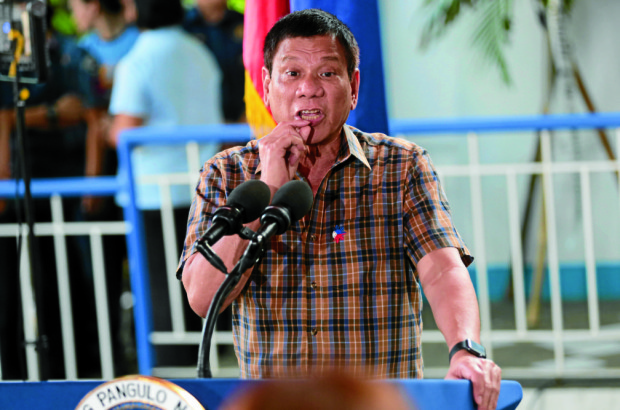While acknowledging the high approval and trust ratings of President Duterte, Sen. Panfilo Lacson on Wednesday noted a slide in the numbers that he said should be looked into.
Lacson attributed the slide to Mr. Duterte’s controversial pronouncements against the country’s allies critical of his war on illegal drugs.
“I think the President is overreacting at times, which is unnecessary, because the ones being hit here are our longtime allies, like the United States and the European Union,” he told reporters.
Trust in the President slipped from 91 percent in July to 86 percent two weeks ago, according to Pulse Asia, which conducted the nationwide survey from Sept. 25 to Oct. 1.
Pulse Asia said the drop was not significant because of the survey’s margin of error of plus-or-minus 3 percentage points.
Only 3 percent of the respondents distrusted the President while indecision whether to trust him or not was at
11 percent.
‘Erosion’
The +83 net trust rating of Mr. Duterte in his first 100 days was higher than those of
his predecessors, +78 for Benigno Aquino III in 2010 and +20 for Gloria Macapagal-Arroyo in 2001.
The Pulse Asia survey found that 86 percent of 1,200 respondents “approve of the work done” by Mr. Duterte. Only 3 percent expressed outright disapproval while 11 percent were undecided.
Sen. Leila de Lima, a critic of the administration’s bloody war on drugs and the extrajudicial killings of suspects, also noticed what she called an “erosion” in the President’s trust rating.
Extrajudicial killings
De Lima said the survey showed socioeconomic Classes D and E specifically disapproved the alleged extrajudicial killings in the war on drugs.
“There is repugnance now on extrajudicial killings,” she told reporters.
Mr. Duterte’s trust score was 85 percent among the Socioeconomic Class D and 88 percent among Class D. —REPORTS FROM CHRISTINE O. AVENDAÑO AND MARIELLE MEDINA, INQUIRER RESEARCH
